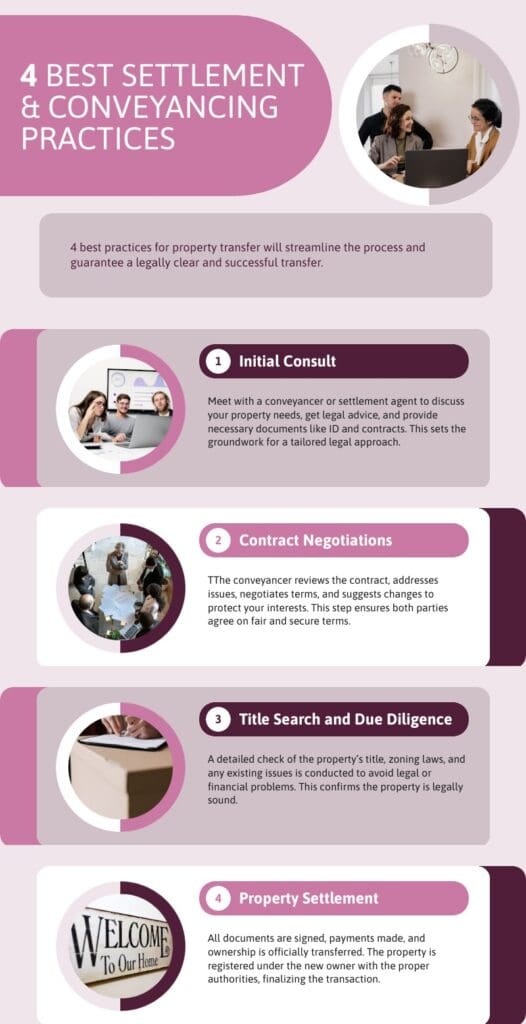The article examines the roles of a conveyancer and a settlement agent, outlining the typical services provided by each, highlighting the differences between them, and offering recommendations for selecting the appropriate professional for your specific property transaction requirements.
Learn more about the conveyancing and settlement processes, as well as reasons why hiring a conveyancer or settlement agent is beneficial if you are a first-time home buyer.
🔑 Key Differences Between Conveyancers and Settlement Agents
- Conveyancers handle the legal side of property transactions (contracts, title searches, legal compliance).
- Settlement agents manage the financial and procedural aspects of the property handover (settlements, fund transfers, documentation).
- Licensing, scope of services, and qualifications differ based on jurisdiction.
⚖️ Service Comparison
- Conveyancers:
- Draft and review contracts
- Conduct due diligence and title searches
- Negotiate terms and manage legal risk
- Settlement Agents:
- Coordinate closing meetings
- Manage fund transfers
- Work with banks and government bodies to complete the ownership transfer
💸 Cost
- Varies based on property complexity and location.
- Some charge flat fees; others, hourly.
- In Melbourne, conveyancers charge $800–$2,500, while settlement agents cost $700–$1,500.
🏠 How to Choose the Right Professional
- Use a conveyancer if your transaction requires legal guidance throughout.
- Choose a settlement agent if you only need support with the final stages of the deal.
- Compare qualifications, experience, service scope, and reviews before deciding.
Conveyancer’s Services
Conveyancers facilitate property transactions by managing the conveyancing process. The process includes:
- preparation of legal documents,
- supervision of the property transfer,
- confirming compliance with property law,
- guaranteeing that property transactions in the real estate market proceed smoothly and in accordance with the law.
1. Property Title Searches
Conveyancers and settlement agents offer property title search services, which are crucial for verifying legal ownership and uncovering any encumbrances or defects that could impact the rights of buyers or sellers. A property title search involves examining public records, deeds, and legal documents to confirm that the property is free from undisclosed claims or liens.
Verification of legal ownership safeguards buyers from acquiring a property with unclear boundaries or becoming entangled in legal disputes, while providing sellers with assurance of a smooth transaction process. Early identification of potential legal issues enables both buyers and sellers to address any discrepancies promptly, promoting a transparent and secure transaction.
2. Contract Preparation and Review
The essential roles of a conveyancer include preparing and reviewing contracts to ensure legal documents are drafted and reviewed in accordance with property law, aiming to protect both parties in a real estate transaction. Conveyancers negotiate any necessary amendments or revisions of the contract language with the other party, proposing changes that are fair and serve the best interests of all involved parties.

Conveyancers often prevent disputes and misunderstandings, ultimately facilitating the successful and painless transaction of real estate.
3. Negotiations
Conveyancers and settlement agents offer settlement negotiation services, providing legal advice and facilitating communication between parties to achieve an agreed-upon settlement during property purchase and sale transactions. Both professionals aid buyers and sellers throughout the negotiation process to ensure a successful property settlement.
Additionally, conveyancers work closely with their clients and other involved parties to identify and resolve any potential issues that may arise during negotiations, ultimately contributing to a smooth property settlement process.
4. Property Settlement
Property settlement is the finalization of the process of transferring property ownership, managed by settlement agents to ensure that all necessary legal and financial steps are completed before the ownership transfer takes place. The process involves:
- conducting title searches,
- confirming any outstanding mortgages or liens,
- preparing legal documents,
- calculating rate and tax adjustments,
- coordinating with lenders,
- confirming the exchange of funds on the settlement day.
What are the Differences Between Conveyancers and Settlement Agents?
Understanding the variances between conveyancers and settlement agents is crucial for individuals engaged in property transactions. Each professional carries out distinct roles in handling conveyancing responsibilities and settlement obligations, essential for adhering to property laws and ensuring the seamless transfer of property ownership.
1. Licensing Requirements
The licensing requirements for conveyancers and settlement agents differ significantly due to their distinct legal responsibilities and the regulatory framework within the conveyancing field. To obtain a license as a conveyancer or settlement agent, one must meet specific qualifications and standards established by the regulatory authorities in the relevant jurisdiction.
Conveyancers typically need to hold a qualification such as a diploma, degree, or Certificate IV in Conveyancing, gain practical work experience or training at a conveyancing office, and pass a licensing examination. Similarly, settlement agents must exhibit adequate knowledge in property transactions, contract law, and regulatory compliance.
Both professions are held to rigorous professional and ethical standards because they handle various legal aspects of property transactions and must ensure that the transactions they oversee comply with all legal requirements to safeguard their clients’ interests.
2. Scope of Services
Conveyancers provide a wider range of services within the conveyancing process, while settlement agents assist with the settlement process and offer associated legal advice. Conveyancers play a crucial role in the legal aspects of property transactions, encompassing tasks such as preparing contracts, reviewing contracts, conducting property title searches, and ensuring compliance with all legal and regulatory requirements. They collaborate with various parties, including real estate agents, mortgage brokers, and inspectors.
On the other hand, settlement agents, known as closing agents in the US, focus on facilitating the property transfer process. They:
- coordinate the final stages of the property transfer,
- organise the settlement meeting,
- confirm the buyer’s lender has received security documents,
- facilitate fund transfers,
- guarantee the proper signing of all required documents.
Additionally, settlement agents serve as intermediaries between the buyer, seller, their representatives, lenders, and solicitors. While both conveyancers and settlement agents assist parties in property transactions, conveyancers handle the legal procedures, while settlement agents aid in the concluding phases of property transfer.
3. Cost: Conveyancers vs Settlement Agent Fees in Melbourne
The costs of conveyancers and settlement agents’ services vary, depending on the complexity of the property transaction and the specific services required. Fees for conveyancers and settlement agents typically range from a few hundred to a few thousand dollars, influenced by factors like the property’s location and value, as well as any additional services such as title searches and contract preparation that may be included.
Some professionals charge a flat fee, while others might opt for an hourly rate. Inquire about all potential costs upfront to avoid unexpected expenses during the transaction.
In Melbourne, the roles of conveyancers and settlement agents, though overlapping, differ in scope and associated costs.
Conveyancers manage the entire legal process of property transactions, including contract preparation, title searches, and ensuring compliance with legal requirements. Their fees in Melbourne typically range from $800 to $2,500, influenced by factors such as property value and transaction complexity. For instance, one firm charges a fixed fee of $800 plus GST, with additional disbursements between $300 and $400.
Settlement agents focus mainly on the final stages of property transfer, handling document signings and disbursement of funds. In Melbourne, their fees typically range from $700 to $1,500, with some charging a fixed rate and others basing costs on the property’s sale price or complexity.
Which One Should You Choose: Conveyancer or Settlement Agent?

Your choice between a conveyancer and a settlement agent depends on whether you need comprehensive legal advice throughout the entire property purchase or sale transaction, or just assistance specifically during the settlement phase.
1. Consider Your Needs
The first step in determining whether to engage a conveyancer or a settlement agent is assessing your specific needs in a property transaction. Each professional has distinct competencies that align with different aspects of the conveyancing process and legal responsibilities.
To assess your requirements, consider factors such as the complexity of the property transaction, the urgency of the process, and your familiarity with legal procedures. The better you understand the scope of work in your transaction, the more informed decision you can make on whether a conveyancer specializing in legal documentation and compliance or a settlement agent focusing on the financial aspects of the settlement is better suited to meet your needs.
2. Research and Compare
When researching and comparing conveyancing specialists and settlement specialists in the property market, investors can find the best service providers who are qualified to meet their transaction needs and provide reliable services. To assess potential specialists, consider the following criteria.
- First, evaluate their credentials by assessing their licenses, certifications, and qualifications related to property transactions.
- Next, consider their experience by looking at how long they have been in practice, how many similar cases they have successfully handled, and what their track record of successful settlements is.
- Additionally, examine the variety and quality of services offered by the specialist to determine if they align with your needs.
- Lastly, assess the reputation of the specialist by seeking referrals, reading reviews, and testimonials from past clients to gauge their reputation and level of client satisfaction.
3. Check for Reviews and Testimonials
Reviews and testimonials of conveyancing services and settlement providers offer evidence both supporting and questioning their capability to safeguard buyers and sellers. It is important to seek testimonials that provide detailed instances of the provider’s performance, particularly in complex or challenging situations or when emphasizing superior customer service.
Accounts offer a clearer understanding of the personalized services that a provider can offer. Reviews that highlight communication, pricing transparency, timeliness, and overall satisfaction serve as reliable indicators of a trustworthy and protective service within the real estate industry.
What to Expect During the Conveyancing or Settlement Process?
With an understanding that the conveyancing or settlement process, which involves property transfer, includes the preparation of legal documents, negotiation of contract terms, and the final property settlement, the 4 best practices for property transfer are formulated to streamline the process and guarantee a legally clear and successful transfer.
1. Initial Consultation
The initial consultation with a conveyancer or settlement agent is the first meeting during which you receive legal advice and discuss your specific needs and expectations for your property transaction.
In the meeting, the conveyancer or settlement agent will provide advice on the legal aspects of property transactions, including contract conditions, legislation, and potential risks. They will gather detailed information about the property, such as the address, current owner, and any specific concerns or requirements you may have.
Clients are usually required to provide identification, proof of address, and relevant documentation like the contract of sale or any existing legal agreements related to the property. The information and preferences shared during the initial consultation are used to customize the legal advice and strategies for carrying out the property transaction to best suit the client’s needs.
2. Contract Negotiations
In conveyancing and settlement, contract negotiations play a vital role in ensuring that all legal requirements are met and that the terms are equitable to both parties. At the contract negotiation stage, the conveyancer or settlement agent:
- conducts a thorough review of the contract’s terms and conditions,
- identifies issues,
- engages in negotiations with the other party,
- achieve a mutually acceptable agreement,
- propose modifications if needed,
- seek clarification,
- include specific provisions to protect the client’s interests.
Effective negotiation guarantees that both parties will reach a fair and secure agreement, facilitating an obstacle-free property transaction.
3. Property Title Search and Due Diligence
As part of the conveyancer’s responsibilities to safeguard the buyer’s rights, a property title search and due diligence are conducted to ensure the property is free of encumbrances and that all legal documents are properly executed.
A property title search helps identify any issues, such as liens, unpaid mortgages, or property disagreements, by examining public records, deeds, and other documents related to the property’s ownership history. Due diligence may involve reviewing zoning regulations, environmental assessments, and property surveys to confirm compliance with local laws.
Measures prevent unexpected legal disputes and financial liabilities for buyers, ensuring a legally secure property transaction that protects the buyer’s investment.
4. Property Settlement
During the property settlement phase of the settlement process, all settlement documents are signed, and the transfer of property ownership is completed, thereby finalizing the property transaction. At this stage, all legal and financial obligations are fulfilled. The signing of the settlement documents is followed by the transfer of funds, concluding the financial aspect of the transaction.
Subsequently, the official transfer of property ownership occurs, symbolizing the change of ownership. The process is registering the transfer with the relevant authorities to legally recognize the new owner.
What are the Benefits of Hiring a Conveyancer or Settlement Agent?
Hiring a conveyancer or settlement agent offers several benefits, such as access to legal expertise, assistance throughout the conveyancing and settlement process, and the assurance that all legal and procedural requirements are fulfilled to secure a successful transaction.

1. Legal Expertise
Conveyancers or settlement agents provide a key benefit through their legal expertise in property law and conveyancing regulations, ensuring that all legal aspects of a real estate transaction are handled correctly.
Their knowledge and skills help manage various legal aspects of property transactions, including drafting contracts, conducting title searches, and ensuring compliance with regional regulations competently and professionally.
Conveyancers and settlement agents also offer valuable insights into property laws, offering reassurance to buyers and sellers throughout the transaction.
2. Time and Stress Savings
A conveyancer’s or settlement agent’s role is to save the client time by handling the complexity and effort of conveyancing and transaction work, including:
- legal paperwork,
- title searches,
- communication with various parties involved in the property transfer.
In most cases, hiring a professional conveyancer or settlement agent saves you time because of their expertise in managing the process more efficiently than you could independently.
The best conveyancers and settlement agents take a hands-on approach, understanding the necessary steps and executing them effectively. Beyond saving time, another benefit of employing conveyancers or settlement agents is providing clients with peace of mind. Clients can focus on other activities knowing that their property transaction is being professionally managed, ensuring a proper and effective process.
3. Avoid Costly Mistakes
Utilizing the services of a conveyancer or settlement agent prevents costly mistakes. They thoroughly review all legal documents and ensure the proper management of every aspect of the property transaction.
Common mistakes that can occur in property transactions include:
- errors in property titles,
- omission of important clauses in contracts,
- misunderstanding complex legal terminology,
- settlement process delays,
- disputes between parties,
- financial losses.
Due to the legal team’s expertise and experience, they identify and rectify any errors, safeguarding clients from unnecessary expenses and complications.
Conveyancer vs Settlement Agent Short Summary
For first home buyers, hiring a conveyancer or settlement agent offers many benefits. Their expertise helps avoid costly mistakes and ensures legal compliance. They handle complex legal paperwork, conduct title searches, and manage all aspects of the property transfer.
Conveyancers prepare and review contracts, negotiate terms, and provide legal advice. Settlement agents focus on the final stages of the property transfer, coordinating with all parties to ensure a smooth transaction. Their involvement saves you time and reduces stress by managing the entire process efficiently.
Understanding conveyancer and settlement agent roles and services helps you choose the right professional. A well-managed transaction guarantees a successful and secure property ownership transfer. Enjoy peace of mind during the important step of your first home purchase.
Frequently Asked Questions
What is the difference between a conveyancer and a settlement agent?
A conveyancer is a licensed professional who specializes in the legal aspects of transferring property ownership, while a settlement agent is a licensed professional who handles the financial aspects of the property transaction.
Do I need to hire a conveyancer or a settlement agent when buying or selling a property?
In some states, it is a legal requirement to hire a conveyancer or a settlement agent for property transactions. However, even in states where it is not mandatory, it is highly recommended to hire one to ensure a smooth and legally sound transaction.
What services do conveyancers and settlement agents provide?
Conveyancers handle the legal aspects of property transfer, including title searches, contract reviews, and preparing legal documents. Settlement agents, on the other hand, handle the financial aspects, including liaising with financial institutions, calculating taxes and fees, and organizing payments.
Can a conveyancer also act as a settlement agent, or vice versa?
Yes, in some states, a conveyancer can also offer settlement agent services and vice versa. However, it is important to check the licensing laws in your state to ensure that the professional you hire is legally allowed to provide services.
Which is more cost-effective, hiring a conveyancer or a settlement agent?
The cost of hiring a conveyancer or a settlement agent may vary depending on several factors, such as the complexity of the transaction and the professional’s experience. It is best to obtain quotes from several professionals and compare their prices and services to determine which is more cost-effective for your specific transaction.
Can I handle the legal and financial aspects of a property transaction myself without hiring a conveyancer or a settlement agent?
While it is possible to handle some aspects of a property transaction yourself, hiring a conveyancer or a settlement agent can provide peace of mind and ensure that all legal and financial requirements are met. It is always best to seek professional assistance to avoid any potential issues or legal complications.
Get your quote today.
Relax knowing our experts are handling your property conveyancing.










